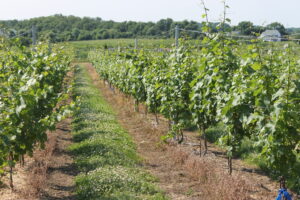Do you h ave an idea you would like to try on your farm that is related to sustainable agriculture? Stephen Komar, Rutgers SARE Coordinator and Sussex County Agricultural Agent, would like to announce that Northeast SARE will open the website for 2023 applications for Farmer Grants on October 1st. Approximately $750,000 has been allocated to fund projects for this grant cycle. Individual awards typically range from $5,000 to $30,000, depending upon a project’s complexity and duration. Projects must be related to sustainable agriculture and results are to be shared through a final report to SARE along with some type of outreach by the farmer as part of the project.
ave an idea you would like to try on your farm that is related to sustainable agriculture? Stephen Komar, Rutgers SARE Coordinator and Sussex County Agricultural Agent, would like to announce that Northeast SARE will open the website for 2023 applications for Farmer Grants on October 1st. Approximately $750,000 has been allocated to fund projects for this grant cycle. Individual awards typically range from $5,000 to $30,000, depending upon a project’s complexity and duration. Projects must be related to sustainable agriculture and results are to be shared through a final report to SARE along with some type of outreach by the farmer as part of the project.
The online system for submitting proposals will open on Oct 1, 2022. Proposals are due no later than 5:00 p.m. EST on November 15, 2022. Go to Northeast-SARE-Farmer-Grant-Call-for-Proposals.pdf for more information.
Northeast SARE Farmer Grants provide the resources farmers need to explore new concepts in sustainable agriculture conducted through experiments, surveys, prototypes, on-farm demonstrations or other research and education techniques. Projects address issues that affect farming with long-term sustainability in mind. Northeast SARE funds projects in a wide variety of topics, including marketing and business, crop production, raising livestock, aquaculture, social sustainability, climate-smart agriculture practices, urban and indigenous agriculture and more.
The goals of SARE Farmer Grants are to help farmers try new things that could improve their operations and to share that information with others. There are also some other restrictions for budget items. Funds can be used to conduct the research project including paying farmers for their time, for project-related materials, for project costs like consulting fees or soil tests, and any communications or outreach expenses associated with telling others about project results. This grant program is not meant to help start or expand farm businesses. Farmer Grant funds cannot be used for capital costs associated with building a barn, greenhouse, or other major farm fixture, nor can funds be used to start a farm, purchase durable equipment like tractors or computers, or for any utility, telephone, or other costs that would be there in the absence of the project.
Farmer and employee wages can be included in a Farmer Grant budget for work done specifically on the grant project. Applicants should include a reasonable wage for their work on a grant project. In New Jersey, the current adverse wage rate used for the H2-A farm worker program is currently $15.54 per hour and could help gauge wages for employees time on the project. For farmer/project manager) wages, the rate to use would be higher and could be based on the complexity of the tasks on the project.
In addition, each project must include a technical advisor to assist with the project. Technical advisors can be anyone who is an agricultural service provider, such as your local cooperative extension agricultural agent, USDA personnel, an agricultural consultant, etc. In New Jersey and other states, SARE Coordinators are not eligible to be technical coordinators due to a conflict of interest of leadership in the program. Therefore, Agricultural Agents, Stephen Komar (Rutgers SARE Coordinator) and Michelle Infante-Casella (Rutgers SARE Assistant Coordinator) are not able to be technical advisors to grants. However, if you have questions about the grant process, they both can help answer questions or point farmers in the right direction to identify technical advisors.
A SARE Farmer Grant informational webinar featuring Tommye Lou Rafes, who has received multiple SARE Farmer Grants, will take place at 12:00 p.m. on October 4, 2022. This webinar information will help farmers thinking of applying for a SARE grant to learn about the process and types of projects that fit this program. To register for the webinar go to northeast.sare.org/farmergrantwebinar
The Northeast region includes Connecticut, Delaware, Maine, Massachusetts, Maryland, New Hampshire, New Jersey, New York, Pennsylvania, Rhode Island, West Virginia, Vermont, and Washington, D.C. Like other SARE Grants, Farmer Grants are competitive and will be judged against other applicants in the region.
To learn more about SARE project in New Jersey see New Jersey State Fact Sheet (sare.org)
